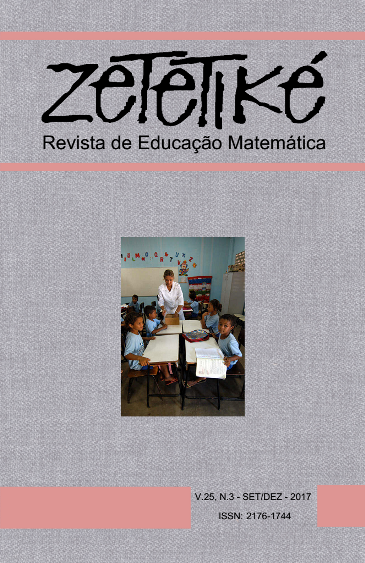Abstract
This work is part of a study of a qualitative and essentially interpretative nature in which the analysis of written
production was used and a stages test, developed with nine teachers of the early grades of the Fundamental
Teaching in a public school in Paraná State. This (progressive) stage test, taken as a formative assessment, was
analyzed as a way to achieve of a guided reinvention on the Realistic Mathematics Education perspective,
enabled the researcher/trainer to evaluate the participants work in different moments, in order to make
interventions considered appropriate. The tests questions were the start point for the reinvention process.The
stage of the research revealed that different strategies, sometimes reflecting different levels, could be provoked
and used productively in the learning process. For this article we chose to present the study of the production of
one participant.
References
Allal, L. (1986). Estratégias de Avaliação Formativa: Concepções Psicopedagógicas e Modalidades de Aplicação. In: L. Allal, J. Cardinet & P. Perrenoud (Eds.), A Avaliação Formativa Num Ensino Diferenciado (pp. 175-209). Coimbra: Livraria Almedina.
Allal, L., & Lopez L. M. (2005). Formative assessment of learning: A review of publications in French. In: OCDE/CERI (Ed.), Formative assessment: Improving learning in secondary classrooms (pp. 241-264). Paris: OCDE.
Barlow, M. (2006). Avaliação escolar - mitos e realidades. Porto Alegre: Artmed.
Black, P. & Wiliam, D. (2003). In praise of educational research: formative assessment. British Educational Research Journal, 29(5): 623–37.
Buriasco, R. L. C. (2009). Introdução à análise da produção escrita: prática de investigação em avaliação In: I. L. Batista & R. F. Salvi, R. F. (Orgs.), Pós-Graduação em Ensino de Ciências e Educação Matemática: um perfil de pesquisas (pp.157-166). Londrina: EDUEL.
Cizek, G. J. (2010). An Introduction to Formative Assessment: History, Characteristics, and Challenges. In: H. L. Andrade & G. J. Cizek, Handbook of Formative Assessment (pp. 3-17). New York: Taylor & Francis.
De Lange, J. (1999). Framework for classroom assessment in mathematics. Madison: WCER. Retirado em 10 de junho, 2008, de www.fi.uu.nl/catch/products/framework/de_lange_framework.doc.
Freudenthal, H. (1973). Mathematics as an educational task. Dordrecht, The Netherlands: Reidel.
Freudenthal, H. (1991). Revisiting mathematics education. Netherlands: Kluwer Academic Publishers.
Gravemeijer, K., & Doorman, M. (1999). Context problems in realistic mathematics education: a calculus course as an example. Educational Studies in Mathematics, 39(1), 111-129.
Gravemeijer, K. P. E. (2005). What makes mathematics so difficult, and what can we do about it? In: L. Santos, A. P. Canavarro & J. Brocardo (Eds.), Educação matemática: caminhos e encruzilhadas (pp. 83-101). Lisboa: APM.
Gravemeijer, K., & Cobb, P. (2006). Design research from a learning design perspective. In: T. Plomp & N. Nieveen, Educational design research (pp. 72–113). London: Routledge.
Hadji, C. (1994). A avaliação regras do jogo: das intenções aos instrumentos. 4. ed. Portugal: Porto Editora.
Hadji, C. (2011). Ajudar os alunos a fazer a autorregulação da sua aprendizagem: Por quê? Como? (Visando um ensino com orientação construtivista). Pinhais: Editora Melo.
Heritage, M. (2007). Formative Assessment: What Do Teachers Need to Know and Do? Phi Delta Kappan, Arlington, 89, 140-145.
Pinchok, N., & Brandt, W. C. (2009). Connecting formative assessment research to practice: An introductory guide for educators. Washington, DC: Learning Point Associates.
Van Den Heuvel-Panhuizen, M. V. D. (1996). Assessment and realistic mathematics education. Utrecht: CD-ß Press/Freudenthal Institute, Utrecht University.
Van Den Heuvel-Panhuizen, M. V. D. (2001). Realistic Mathematics Education as work in progress. In: F. L. Lin (Ed.) Common Sense in Mathematics Education, (pp. 1-43), Proceedings of 2001 The Netherlands and Taiwan Conference on Mathematics Education, Taiwan, 2001. Retirado em 18 de novembro, 2010, de http://www.fi.uu.nl/publicaties/literatuur/4966.pdf.
Wilian, D. (2010). An Integrative Summary of the Research Literature and Implications for a New Theory of Formative Assessment. In: H. L. Andrade & G. J. Cizek, Handbook of Formative Assessment (pp. 18-40). New York: Taylor & Francis.

This work is licensed under a Creative Commons Attribution-NonCommercial-NoDerivatives 4.0 International License.
Copyright (c) 2017 Zetetike


